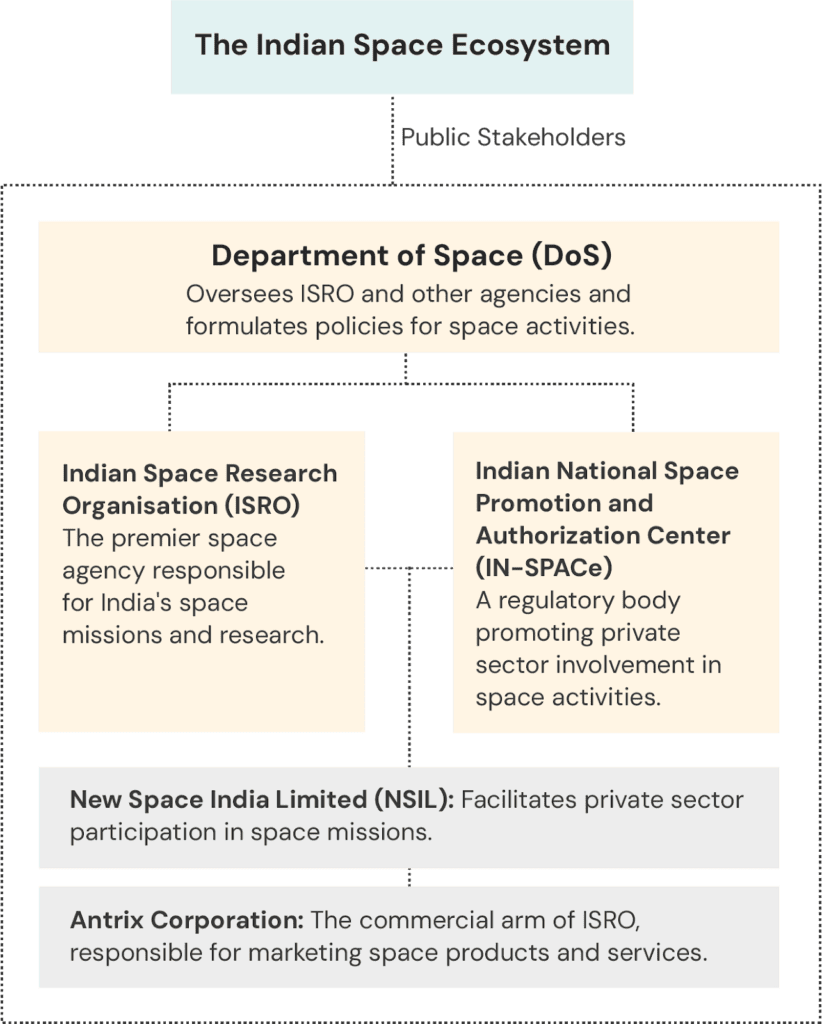Quick Summary
India’s spacetech sector is experiencing significant growth, driven by increased private sector involvement and supportive government policies. The Indian government has initiated reforms to encourage private participation in satellite and rocket manufacturing, aiming to emulate the success of organizations like NASA and SpaceX. Notable startups, such as Skyroot Aerospace and Agnikul Cosmos, have emerged, contributing to the industry’s expansion. Despite a 55% decline in funding in 2024, the government has approved a $119 million fund to support space startups, reflecting its commitment to bolstering the sector. With these developments, India aims to increase its share of the global commercial space market, currently at 2%, to 10% by 2030.
Blog Content Overview
- 1 What is Spacetech and What does it comprise?
- 2 Key Regulatory Bodies of Spacetech in India
- 3 Key Legislations and Policies
- 4 International Treaties
- 5 Contractual Agreements for a Space Company in India
- 6 Intellectual Property (IP) for Space Tech Companies in India
- 7 India’s Foreign Direct Investment (FDI) Policy in the Space Sector
- 8 Gaps in the FDI Policy 2024 for Space-Tech
- 9 Concluding Thoughts
What is Spacetech and What does it comprise?
Space technology, often shortened to spacetech, refers to the application of engineering and technological advancements for the exploration and utilization of space. It encompasses a vast array of disciplines, from designing and launching satellites to developing advanced propulsion systems for efficient space travel. Ground infrastructure, robotics, space situational awareness, and even life sciences for human spaceflight all fall under the umbrella of space-tech.[1]
Spacetech comprises:
- Upstream Segment: activities involving design, development and production processes necessary for creating space infrastructure and technology. This additionally encompasses material supply to the integration and launch of space vehicles, ensuring successful deployment and operation of spacecraft and satellites.
- Downstream Segment: activities involving utilization and application of space-based data and services, focusing on the development and deployment of satellite-based products for various sectors.
- Auxiliary Segment: activities related to space insurance services, space education, training and outreach programs, collaborations and technology transfers, and commercialization of spin-off products.
The space technology sector in India operates under a comprehensive legal and regulatory framework designed to promote innovation, facilitate private sector participation, and protect national interests. This framework is governed by several key regulatory bodies and policies that ensure the sector’s growth and compliance with both national and international standards. This handy overview aims to provide a quick reference guide to understand the complex legal and regulatory framework governing India’s space sector.

Key Regulatory Bodies of Spacetech in India
| S. No. | Regulatory Body | Role |
| 1. | Department of Space (DoS) | 1. The apex body for space activities in India, DoS oversees policy formulation and implementation. 2. DoS coordinates between ISRO, other government agencies, and private entities to ensure policies are in line with national objectives. It also represents India in international space forums. |
| 2. | Indian Space Research Organisation (ISRO) | 1. As India’s premier space agency, ISRO is responsible for the planning and execution of space missions, satellite launches, and space research. 2. ISRO governs the operational aspects of space missions, including satellite deployment, mission planning, and research initiatives. It ensures adherence to safety protocols and technical standards. |
| 3. | Indian National Space Promotion and Authorization Center (IN-SPACe) | 1. IN-SPACe acts as a regulatory body to promote and authorize space activities by non-governmental entities. 2. Provides a single-window clearance for private sector space projects, ensuring they meet safety and compliance standards. IN-SPACe facilitates private sector participation by streamlining regulatory processes. |
| 4. | NewSpace India Limited (NSIL) | 1. The commercial arm of ISRO, NSIL is responsible for promoting Indian space capabilities globally. 2. Facilitates commercial satellite launches and space-related services, ensuring compliance with international trade laws. NSIL manages the commercialization of space products, technical consultancy services, and technology transfer. |
| 5. | Antrix Corporation Limited (ACL) | 1. The marketing arm of ISRO, Antrix Corporation Limited is responsible for promoting and commercially exploiting space products, technical consultancy services, and transfer of technologies developed by ISRO. 2. ACL deals with the commercialization of space products and services, including satellite transponder leasing, satellite launches through PSLV and GSLV, marketing of data from Indian remote sensing satellites, and the establishment of ground systems and networks. ACL ensures compliance with international trade and export control regulations. |
Key Legislations and Policies
| S. No. | Statue | Purpose | Provision |
| 1. | ISRO Act (1969) | The ISRO Act was enacted to establish the Indian Space Research Organisation (ISRO) as the primary body responsible for India’s space program. | The Act defines ISRO’s mandate to conduct space research and exploration. It empowers ISRO to develop space technology, launch vehicles, and satellites, and to carry out research in space science. The Act also outlines the organizational structure and governance of ISRO, ensuring it operates under the guidance of the Department of Space. |
| 2. | Satellite Communication Policy (1997) | This policy aims to foster the growth of a robust domestic satellite communication industry. | The policy provides guidelines for satellite communication services, including licensing procedures, spectrum allocation, and operational standards. It promotes the use of satellite technology for telecommunications, broadcasting, and internet services. The policy encourages private sector participation and aims to enhance India’s capabilities in satellite communication. |
| 3. | Revised Remote Sensing Data Policy (RSDP) (2011) | The RSDP regulates the collection, dissemination, and use of satellite remote sensing data. | The policy mandates that remote sensing data with a ground resolution of 1 meter or less be acquired only through government channels. It sets guidelines for data acquisition, processing, and distribution to ensure national security and strategic interests. The policy aims to balance data accessibility with security concerns, promoting the use of remote sensing data for sustainable development and disaster management. |
| 4. | NRSC Guidelines (2011) | Issued by: ISRO’s National Remote Sensing Centre (NRSC) These guidelines focus on regulating the acquisition and dissemination of remote sensing data. | The guidelines set standards for data handling, including data quality, accuracy, and security. They outline the procedures for data licensing, usage, and dissemination, ensuring that remote sensing data is used responsibly and in compliance with national policies. |
| 5. | ISRO Technology Transfer Policy and Guidelines (2020) | To establish a framework for transferring technologies developed by ISRO and the Department of Space (DoS) to industry partners. | The policy facilitates the commercialization of ISRO’s technologies, promoting their wider application in various industries. It includes guidelines for licensing, royalty agreements, and intellectual property rights. The policy aims to foster innovation and support the growth of the Indian space technology ecosystem by enabling industry access to advanced space technologies. |
| 6. | Geospatial Guidelines, 2021 | The Geospatial Guidelines aim to liberalize the geospatial data sector in India, promoting ease of access and utilization of geospatial data and private sector participation. | The Geospatial Guidelines, 2021, largely permit foreign investments up to 100% under the automatic route with limited foreign investment restrictions. These guidelines are relevant to satellite-generated data, a key component of the space-tech sector. Additionally, the guidelines remove specific restrictions on satellite-generated data, promoting the wider use of satellite imagery. The provisions also ensure alignment with national privacy laws and international treaties. |
| 7. | Foreign Direct Investment (FDI) Policy | Allow for higher FDI limits (up to 74% for satellites, 49% for launch vehicles, and 100% for components). | The policy sets guidelines for foreign investments in space-related activities, encouraging international partnerships and collaboration. It aims to enhance the competitiveness of the Indian space industry by facilitating access to global markets and advanced technologies. However, clarification is needed on the definitions of “satellite data products” and the categorization of launch vehicle sub-components to ensure smooth implementation. |
| 8. | Constitution of India (Articles 51 & 73) | Upholds India’s obligations under the Vienna Convention on the Law of Treaties. | These articles ensure that India complies with established legal principles for peaceful space exploration. Article 51 promotes international peace and security, while Article 73 extends the executive power of the Union to the exercise of rights under international treaties and agreements. |
| 9. | Telecommunications Act (Upcoming) | To clarify regulations for satellite communication. | The Act will streamline processes for obtaining licenses and spectrum allocation for satellite communication services. It aims to enhance regulatory clarity, reduce bureaucratic hurdles, and promote the efficient use of satellite communication technology in India. |
| 10. | Indian Space Policy (2023) | A transformative policy allowing private companies to offer satellite communication services using their own satellites or leased capacity. | The policy permits private entities to operate in both Geostationary (GSO) and Non-Geostationary (NGSO) orbits. It simplifies the approval process by designating IN-SPACe as the single nodal agency for all approvals, promoting ease of doing business and fostering innovation in the private space sector. |
| 11. | Department of Telecommunications (DoT) – Satcom Reforms (2022) | To complement the 2023 Space Policy by expediting application processing times and simplifying procedures. | The reforms lower compliance requirements for private companies, establish a clear roadmap for obtaining necessary clearances, and streamline regulatory processes. They aim to create a more conducive environment for the growth of the satellite communication industry. |
| 12. | Foreign Exchange Management (Non-Debt Instruments) Rules (2019; amended 2024) | To complement the 2023 Space Policy by recognising the Space sector and liberalizing the foreign direct investment thresholds. | The reform liberalizes the thresholds for automatic entry of foreign direct investment through the space sector, reducing the burden of obtaining governmental approval for such investments. |
International Treaties
India is a signatory to several key space treaties, ensuring compliance with international norms for peaceful space exploration:
| S. No. | Treaty | Provision |
| 1. | Outer Space Treaty (1967) | The treaty includes guidelines on the non-appropriation of outer space, liability for space activities, and the prohibition of nuclear weapons in space. It promotes the peaceful use of outer space and international cooperation. |
| 2. | Agreement on the Rescue of Astronauts (1968) | This agreement obligates countries to assist astronauts in distress and return them to their country of origin. It establishes protocols for the rescue and safe return of astronauts. |
| 3. | Convention on International Liability for Damage Caused by Space Objects (1972) | The convention establishes a legal framework for liability and compensation for damages caused by space objects. It outlines procedures for resolving liability claims and determining compensation amounts. |
| 4. | Agreement Governing the Activities of States on the Moon and Other Celestial Bodies (1979) | The agreement regulates activities on the Moon and other celestial bodies, emphasizing their use for peaceful purposes. It promotes international cooperation and prohibits the establishment of military bases on celestial bodies. |
| 5. | Convention on Registration of Objects Launched into Outer Space (1975) | The convention mandates the registration of space objects launched by countries, ensuring transparency and accountability. It requires countries to provide details of their space objects, including orbit parameters and launch information. |
Contractual Agreements for a Space Company in India
Establishing and operating a space company in India involves various contractual agreements [2] to protect intellectual property, and manage commercial relationships effectively.
| S. No. | Name of the Legal Agreement | Description |
| Regulatory Compliance | ||
| 1. | Licensing Agreements | These agreements ensure compliance for satellite launches and operations. They must include clauses for adherence to regulatory guidelines, renewal terms, and compliance with any changes in regulations. |
| 2. | Launch Service Agreements | These contracts outline terms for satellite launches using Indian vehicles, covering payload specifications, launch schedules, costs, risk allocation, insurance, and liability for launch failures or delays. |
| Intellectual Property (IP) Protection | ||
| 3. | Technology Transfer Agreements | These agreements govern technology transfers from ISRO or other entities, defining the technology, IP ownership, usage rights, confidentiality, sublicensing, and further development. |
| 4. | Non-Disclosure Agreements (NDAs) | NDAs protect trade secrets and confidential information, defining confidential information, duration of obligations, and permitted disclosures. |
| 5. | IP Licensing Agreements | These agreements allow the use of patented technologies, trademarks, or copyrighted materials, specifying the license scope, usage rights, territorial limitations, royalty payments, and mechanisms for addressing infringement. |
| Commercial Contracts | ||
| 6. | Satellite Lease Agreements | These contracts specify terms for leasing satellite transponders or entire satellites, including lease periods, payment terms, service levels, maintenance, upgrades, and liability for interruptions. |
| 7. | Service Level Agreements (SLAs) | SLAs establish performance metrics and service quality standards for satellite communication services, defining KPIs, penalties, service monitoring, reporting, and dispute resolution mechanisms. |
| 8. | Joint Venture (JV) Agreements | JV agreements define roles, responsibilities, and contributions in joint projects, including profit sharing, management structure, exit strategies, IP ownership, confidentiality, and dispute resolution. |
| Risk Management | ||
| 9. | Insurance Contracts | These contracts cover risks associated with satellite launches and operations, providing comprehensive coverage for pre-launch, launch, and in-orbit phases, including claim procedures. |
| 10. | Indemnity Clauses | Indemnity clauses allocate risk and liability, defining the scope of indemnity, covered events, third-party claims, defense obligations, and mutual indemnity arrangements. |
| Operational Agreements | ||
| 11. | Ground Station Agreements | These contracts govern the use and operation of ground stations, defining access rights, maintenance, operational support, payment terms, service levels, and liability for interruptions. |
| 12. | Data Sharing and Usage Agreements | These agreements outline terms for sharing and using satellite data, defining data access rights, usage limitations, data security, privacy, compliance, ownership, licensing, and monetization. |
Intellectual Property (IP) for Space Tech Companies in India
The legal framework for Intellectual Property Rights (IPR) in India provides robust protection for space tech companies by protecting innovations, fostering creativity, and encouraging investment. The Indian government has established a legal framework to safeguard IPR in the space industry, ensuring that companies can secure and monetize their innovations.
| S. No. | Types of IP | Description | Example |
| 1 | Trademark | Function: Companies can register trademarks for their brands, logos, and other identifiers. This helps in building brand recognition and protecting against unauthorized use or infringement. Registration: Trademarks registration is optional but advisable, and once granted will be valid for 10 years, renewable every decade. |  Names, word-marks, logos, symbols, tag-lines, short sound marks, and more. Names, word-marks, logos, symbols, tag-lines, short sound marks, and more. |
| 2 | Copyright | Function: Space tech companies can protect their software, technical manuals, and marketing materials under copyright law. Prevents unauthorized reproduction and distribution of proprietary content. Registration: The creator owns the copyright 60 years from creation before the work becomes public. | Software code, satellite imagery, technical documentation, mission designs, manuals, and more. Example – Satellite mission documentation, control software |
| 3 | Patent | Function: Space tech companies can file patents for new inventions related to space technology, including satellite components, launch vehicles, and software algorithms. Registration: The Act provides protection for 20 years from the date of filing, allowing companies to exclusively exploit their inventions. | Rocket designs, propulsion systems, satellite components, drastically unique or different technology, and more. Example – ISRO’s cryogenic engine patents |
| 4 | Design | Function: Companies can register designs for components and products used in space technology, such as satellite bodies and ground station equipment. Registration: The Designs Act offers protection for registered designs enumerated as follows: Initial validity: A registered design certificate is valid for 10 years from the date of registration. Extension: The protection can be extended for an additional 5 years by filing an application and paying the prescribed fee. | Satellite structures, rocket exterior designs, space module configurations, and more. Example – Exterior design of the GSLV Mk III rocket |
| 5 | Trade Secret | Function: Trade secrets are confidential, commercially valuable information known to a limited group and protected by the rightful owner through reasonable measures, typically including confidentiality agreements. Provisions: Although there is no specific legislation for trade secrets in India, they are protected under common law principles of confidentiality and contract law. Companies can use non-disclosure agreements (NDAs), confidentiality clauses, and other contractual arrangements to protect their trade secrets. | Manufacturing processes, proprietary algorithms, satellite data processing techniques, and more. Example- Proprietary algorithms for satellite data compression and transmission |
India’s Foreign Direct Investment (FDI) Policy in the Space Sector
In line with the vision of the Indian Space Policy 2023 and further to the Union Budget 2024-25, the Foreign Exchange Management (Non-Debt Instrument) Rules, 2019 (“NDI Rules”) were amended by way of Gazette notification dated 16 April 2024[3] to prescribe liberalized FDI thresholds for various sub-sectors/activities in India’s spacetech ecosystem. This is seen as a welcome change as the erstwhile policy was restrictive, requiring significant government oversight and limiting avenues for private sector participation.
FDI Policy and amendment to NDI Rules, 2024
Existing foreign investment limits in the space sector are provided under Chapter 5 of the Consolidated FDI Policy Circular of 2020[4], which are yet to be updated to reflect the amendment to the NDI Rules. The NDI Rules recognize “space” as a sector in itself in Schedule I, and the crux of the policy lies in the categorization of space-related activities and the corresponding FDI thresholds. Here’s a breakdown of the key categories and their investment limits:
| Activity | FDI Threshold and Route |
| Satellites – manufacturing & operation; satellite data products, ground segment & user segment | Up to 74% automatic, beyond 74% up to 100% under government route |
| Launch vehicles and associated systems or subsystems, creation of spaceports for launching and receiving spacecraft | Up to 49% automatic, beyond 49% up to 100% under government route |
| Manufacturing of components and systems or sub-systems for satellites, ground segment and user segment | Up to 100% automatic |
The investee entity is required to adhere to sectoral guidelines issued by the Department of Space from time to time. The amended NDI Rules also incorporate definitions for the purpose of identifying the applicable FDI threshold and route:
(i) “Satellites – Manufacturing and Operation”: end-to-end manufacturing and supply of satellite or payload, establishing the satellite systems including control of in-orbit operations of the satellite and payloads;
(ii) “Satellite Data Products”: reception, generation or dissemination of earth observation or remote sensing satellite data and data products including Application Interfaces (API);
(iii) “Ground Segment”: supply of satellite transmit or receive earth stations including earth observation data receive station, gateway, teleports, satellite Telemetry, Tracking and Command (TTC) station and Satellite Control Centre (SCC), etc.;
(iv) “User Segment”: supply of user ground terminals for communicating with the satellite, which are not covered in Ground Segment;
(v) “Launch Vehicles and Associated Systems or Sub-systems”: vehicle and its stages or components that is designed to operate in or place spacecraft with payloads or persons, in a sub-orbital trajectory, or earth orbit or outer space;
(vi) “Manufacturing of components and systems or sub-systems for satellites Ground Segment and User Segment”: comprises the manufacture and supply of the electrical, electronic and mechanical components systems or sub-systems for satellites, Ground Segment and User Segment.
Gaps in the FDI Policy 2024 for Space-Tech
The amendments to the NDI Rules proposed to also be carried out to the existing FDI Policy 2020 aim to liberalize the spacetech sector, but certain gaps and ambiguities still exist that need to be addressed for it to be fully effective.
- Requirement to Comply with Sectoral Guidelines: The policy mandates that investee entities must comply with sectoral guidelines issued by the Department of Space, which counteracts the intended liberalization.
- Clarity on “Satellites – Manufacturing & Operation”: The term “satellites – manufacturing & operation” does not explicitly cover spacecrafts that may not be categorized as satellites, creating potential ambiguity.
- Definition of “Satellite Data Products”: The term “satellite data products” conflicts with the Geospatial Guidelines, which allow up to 100% foreign investment under the automatic route for similar data products, which might lead to regulatory overlaps and conflicts.
- Overlapping Activities: Companies engaged in activities spanning multiple categories (e.g., manufacturing components for both satellites and launch vehicles) must restrict foreign investments to the stricter category thresholds. This may necessitate business restructuring to comply with the new regulations.
- Grandfathering Existing Investments: The policy does not clearly address how existing investments, made under previous interpretations of the FDI rules, will be treated. Companies that received investments without explicit government approval may require post-facto government approval.
Concluding Thoughts
Given the national contribution advancements in space tech bring about, it is natural that a degree of government oversight is still built into the legal and regulatory framework. While the amendments to the NDI Rules signify an exciting turn of events for the space tech sector in India, the significant nature of it is still required to be captured across applicable legislations. Further, the proposed 2024 FDI policy does not completely do away with the requirement to comply with sectoral guidelines, or provide complete clarity on critical terms commonly used in the industry. Further, the nature of overlapping business activities could trigger restructuring of businesses, with no clarity provided on grandfathering existing investments. These are likely to be the subject of any clarificatory orders from the Ministry of Finance (Department of Economic Affairs).
References:
[1] https://it.telangana.gov.in/initiatives/spacetech
[2] In addition to the above agreements, space companies may also need to enter into other agreements, such as marketing agreements, sponsorship agreements, and international collaboration agreements. The specific agreements that a space company needs to enter into will depend on its specific business model and operations.
[3] https://egazette.gov.in/WriteReadData/2024/253724.pdf
[4] https://dpiit.gov.in/sites/default/files/FDI-PolicyCircular-2020-29October2020_0.pdf
We Are Problem Solvers. And Take Accountability.
Related Posts

Succession Planning in Indian Family Businesses
Why 9 in 10 listed companies are family-controlled and why fewer than 2 in 3 have a plan to stay...
Learn More

How a Virtual CFO Gets Your Startup Series A Ready
From Messy Books to Term Sheet A deep-dive for seed-stage founders preparing for their first institutional raise. This report covers...
Learn More

Family Offices in India – The Insider’s Guide for India’s New Wealth Class
India's wealth is no longer just stored in family businesses and fixed deposits. By 2026, over 300 family offices will...
Learn More












